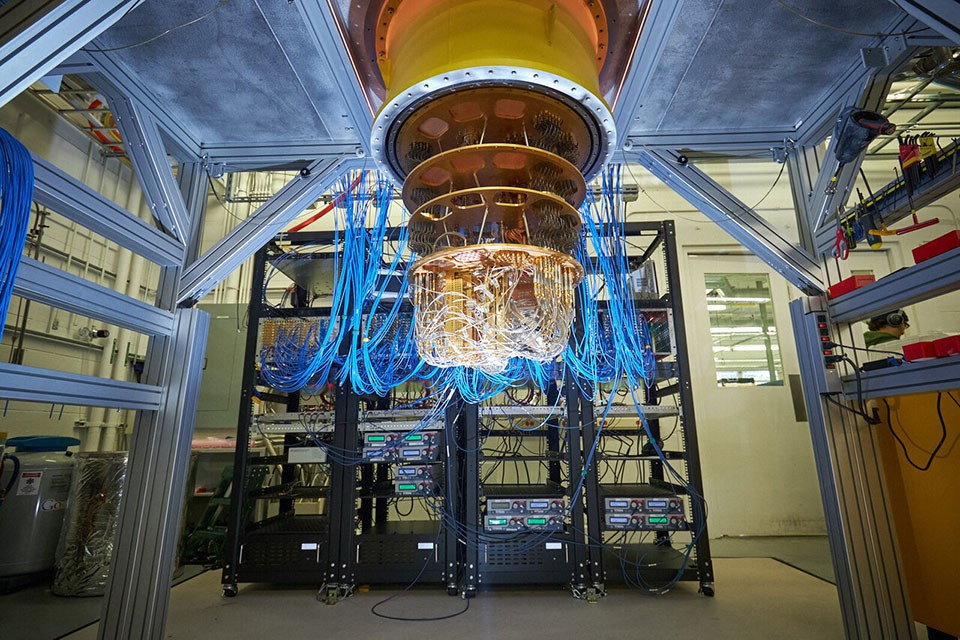How will quantum computers change the world?
(Baonghean.vn) - Quantum computers are expected to solve a series of problems thanks to their superior computing power, making them an important technology for many future applications.
What is a quantum computer?
A quantum computer is a type of computer that uses the principles of quantum mechanics to perform calculations. Quantum mechanics is a branch of physics that describes the behavior of very small objects, such as atoms and particles much smaller than atoms, also known as subatomic particles.
Unlike digital computers, quantum computers operate based on the operation of quantum mechanics to process input data. Thus, simply put, a quantum computer is a computer that operates on the basis of quantum particles.

Quantum computers could have important applications in many different fields, such as materials science, the development of new drugs in pharmaceuticals, financial modeling, military, intelligence, aerospace, nuclear energy, artificial intelligence (AI).... They have the potential to revolutionize many different fields and have a significant impact on the way we live and work.
How do quantum computers work?
Quantum computers use quantum bits, or “qubits,” to store and process information. Qubits are fundamentally different from classical bits, which are used in classical computers and can only have the value 0 or 1. Qubits can exist in superposition states, meaning they can occupy multiple states at the same time. This allows quantum computers to perform some calculations much faster than classical computers.
Quantum computers operate on the principles of quantum mechanics, which describe the behavior of particles at the atomic and subatomic level. One of the key principles of quantum mechanics is wave-particle duality, which means that particles can behave like both waves and particles, depending on how they are observed.
To perform calculations, quantum computers use quantum logic gates, similar to the logic gates used in classical computers. However, while classical logic gates operate on classical bits that can only be in one state at a time, quantum logic gates operate on qubits that can exist in multiple states simultaneously.
In classical computers, the basic unit of information is a “bit,” which can have a value of 0 or 1. Quantum computers use “qubits,” which can simultaneously represent a value of 0, 1, or both. This allows quantum computers to perform multiple calculations at once, instead of sequentially like classical computers.
Additionally, quantum computers can exploit an effect known as “quantum tunneling” to explore multiple possible solutions to a problem at once, rather than searching one at a time like classical computers. This could further speed up quantum computers for certain types of problems.
How will quantum computers change the world?
Quantum computers are capable of performing some calculations much faster than classical computers, making them an important technology for many applications. Quantum computers have the potential to significantly impact many different fields and have far-reaching impacts on society.
Promote scientific research
Quantum computers can be used to perform complex simulations and calculations, allowing scientists to make new discoveries and understand complex phenomena more quickly. This could spur the development of new technologies and new scientific and technical advances in many fields, from medicine and materials science to energy and transportation.
Strengthening cybersecurity and protecting national security
Quantum computers could be used to break current encryption methods, making it more difficult for cybercriminals to access sensitive information. They could also be used to analyze large amounts of data to identify cyber methods and threats, enhancing national security solutions.
Improve health care
Quantum computers can be used in healthcare to perform complex simulations and calculations to identify new drugs and optimize the structures of existing drugs to make them more effective. This could lead to better treatments and therapies for a wide range of diseases and conditions.
Diagnosis in healthcare has a significant impact on patient outcomes. It is becoming increasingly complex and expensive, and some studies suggest that errors can be as high as 25%. Misdiagnosis can be quite costly, not to mention life-threatening; for example, one study found that early detection of colon cancer could improve survival by nine times at a four-fold reduction in costs.
Classification techniques are used in diagnostics such as determining whether a cell is cancerous or not, and quantum computers can help evaluate the results more accurately. In prediction, quantum computers can significantly improve structural predictions of complex structures such as proteins, DNA, RNA.
Improve decision making
Quantum computers can be used to perform complex simulations and calculations to help governments make more informed decisions on a variety of issues, such as economic and environmental policy. Additionally, quantum computers can be used to perform risk assessments and optimize investment portfolios, helping individuals make more informed financial decisions.
Optimizing operations in the transportation and logistics industry
Quantum computers could be used to optimize routing and planning for transportation networks, improve the efficiency of supply chain management and logistics, and improve the efficiency and convenience of personal transportation.
With the presence of quantum computers, all activities on the street are processed in a flash, in addition, these machines can provide the travel routes of vehicles during rush hours at all hot spots in the city completely automatically.
Support research and drug development in the pharmaceutical industry
Quantum computers could be used to perform complex simulations and calculations to identify new drugs and predict their effectiveness and potential side effects. This could significantly speed up the drug development process, which is currently considered a very expensive process.
Additionally, quantum computers could be used to optimize the structures of existing drugs to make them more effective and reduce side effects. This could involve using quantum computers to perform simulations to predict how different drugs will interact with proteins and other molecules in the body.
Quantum computers can also be used to optimize supply chains and logistics for the pharmaceutical industry, improving efficiency and saving costs in drug manufacturing and distribution.
Help revolutionize the field of education
Quantum computers have the potential to revolutionize education, such as being used to analyze large amounts of educational data to identify patterns and tailor learning materials to individual student needs and abilities, and being used to perform complex simulations that allow students to explore and understand complex concepts in a more interactive and engaging way.
Quantum computers can also be used in education to perform complex simulations and calculations to support research and exploration of new problems, providing students and researchers with new tools and resources to learn and explore new problems faster.
Additionally, quantum computers could be used to optimize planning and resource allocation for schools, improving the efficiency of the education system.
How will quantum computers revolutionize different fields?
Banking sector
Quantum computers have the potential to revolutionize the banking industry, such as performing complex risk assessments and portfolio optimization, helping financial institutions make better decisions. They also help analyze large amounts of data to identify patterns and anomalies that can indicate fraudulent activities.
Quantum computers also help optimize trading strategies and reduce transaction execution times, potentially improving the efficiency of financial markets.
Technology sector
Quantum computers help perform complex simulations and calculations, allowing researchers to make new discoveries and understand complex phenomena more quickly. This could lead to the development of new technologies at a faster pace. Quantum computers also help train and run artificial intelligence algorithms, potentially making them more powerful and efficient.
Machine manufacturing sector
Quantum computing has the potential to revolutionize the field of machine learning, such as assisting in the design of new materials with specific properties, such as increased strength or conductivity, while also optimizing manufacturing processes and minimizing waste, improving the efficiency and sustainability of manufacturing.
The industrial applications of quantum computers are considered endless. German automaker BMW is a typical example. Normally, the time to create a new car model takes at least 4 years, of which the longest part is the testing part. But according to Carsten Sapia, Vice President of Strategy, Administration and Security at BMW, applying quantum computers in vehicle operation simulation helps the company shorten this process to at least 6 months.
What are the challenges of quantum computers?
Quantum computers are a promising technology with the potential to revolutionize many different fields, but there are also a number of challenges that need to be overcome to realize their full potential. Here are some of the key challenges facing quantum computers:
Building and scaling quantum computers
Quantum computers are extremely complex and difficult to build, and scaling them up to the point where they can perform practical calculations is challenging. This is because quantum systems are very sensitive to their environment and can be easily disrupted by external factors such as temperature, noise, and electromagnetic fields.
Quantum algorithm development
Although quantum computers have the potential to perform certain calculations much faster than classical computers, developing quantum algorithms that can take advantage of their extremely fast computing capabilities is a complex problem. Research and development of efficient quantum algorithms is seen as a key factor in the development of quantum computers.
Error handling
Quantum computers are prone to errors due to the fragile nature of quantum systems. These errors can accumulate over time and limit the accuracy of quantum calculations. Developing methods to correct these errors is an active area of research in quantum computing.
Building quantum infrastructure
To fully exploit the potential of quantum computers, we will need to build robust infrastructure to support them. This will include developing standards, protocols and technologies to store, transmit and process quantum information.
Overall, while quantum computers have the potential to have a significant impact on many different fields, there are still many challenges to overcome to realize their full potential.
What is the future of quantum computers?
Quantum computers have the potential to revolutionize many different fields and have a profound impact on society. However, it is important to note that quantum computers are still in the early stages of development and it will likely be some time before they are widely available and deployed.
The field of quantum computing is growing rapidly, and there are many active research efforts focused on building and improving quantum computers. In the near term, it is likely that quantum computers will be used to perform specialized tasks in fields such as finance, chemistry, and materials science, where they could offer significant advantages over classical computers.
Quantum computers also help forecast weather and warn of extreme weather events accurately. This increases the ability to save lives and reduce property damage, predicting severe weather patterns and disasters in the distant future, helping people have timely response plans.
In the long term, quantum computers could become more widely available and be used for a wider range of applications. For example, they could be used to perform complex simulations and calculations in areas such as healthcare, energy, and transportation. It is also possible that quantum computers could be used to solve problems that are currently considered too difficult for classical computers.



.jpg)





